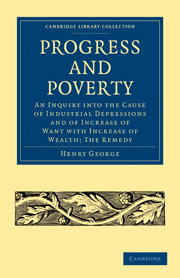 Progress and Poverty
Progress and Poverty Book contents
- Frontmatter
- PREFACE TO FOURTH EDITION
- Contents
- INTRODUCTORY
- BOOK I WAGES AND CAPITAL
- Chapter I The current doctrine—its insufficiency
- Chapter II The meaning of the terms
- Chapter III Wages not drawn from capital, but produced by the labor
- Chapter IV The maintenance of laborers not drawn from capital
- Chapter V The real functions of capital
- BOOK II POPULATION AND SUBSISTENCE
- BOOK III THE LAWS OF DISTRIBUTION
- BOOK IV EFFECT OF MATERIAL PROGRESS UPON THE DISTRIBUTION OF WEALTH
- BOOK V THE PROBLEM SOLVED
- BOOK VI THE REMEDY
- BOOK VII JUSTICE OF THE REMEDY
- BOOK VIII APPLICATION OF THE REMEDY
- BOOK IX EFFECTS OF THE REMEDY
- BOOK X THE LAW OF HUMAN PROGRESS
- CONCLUSION
- INDEX
Chapter IV - The maintenance of laborers not drawn from capital
Published online by Cambridge University Press: 07 September 2011
- Frontmatter
- PREFACE TO FOURTH EDITION
- Contents
- INTRODUCTORY
- BOOK I WAGES AND CAPITAL
- Chapter I The current doctrine—its insufficiency
- Chapter II The meaning of the terms
- Chapter III Wages not drawn from capital, but produced by the labor
- Chapter IV The maintenance of laborers not drawn from capital
- Chapter V The real functions of capital
- BOOK II POPULATION AND SUBSISTENCE
- BOOK III THE LAWS OF DISTRIBUTION
- BOOK IV EFFECT OF MATERIAL PROGRESS UPON THE DISTRIBUTION OF WEALTH
- BOOK V THE PROBLEM SOLVED
- BOOK VI THE REMEDY
- BOOK VII JUSTICE OF THE REMEDY
- BOOK VIII APPLICATION OF THE REMEDY
- BOOK IX EFFECTS OF THE REMEDY
- BOOK X THE LAW OF HUMAN PROGRESS
- CONCLUSION
- INDEX
Summary
But a stumbling block may yet remain, or may recur, in the mind of the reader.
As the plowman cannot eat the furrow, nor a partially completed steam engine aid in any way in producing the clothes the machinist wears, have I not, in the words of John Stuart Mill, “forgotten that the people of a country are maintained and have their wants supplied, not by the produce of present labor, but of past?” Or, to use the language of a popular elementary work—that of Mrs. Fawcett—have I not “forgotten that many months must elapse between the sowing of the seed and the time when the produce of that seed is converted into a loaf of bread,” and that “it is, therefore, evident that laborers cannot live upon that which their labor is assisting to produce, but are maintained by that wealth which their labor, or the labor of others, has previously produced, which wealth is capital?”
The assumption made in these passages—the assumption that it is so self-evident that labor must be subsisted from capital that the proposition has but to be stated to compel recognition—runs through the whole fabric of current political economy. And so confidently is it held that the maintenance of labor is drawn from capital that the proposition that “population regulates itself by the funds which are to employ it, and, therefore, always increases or diminishes with the increase or diminution of capital,” is regarded as equally axiomatic, and in its turn made the basis of important reasoning.
- Type
- Chapter
- Information
- Progress and PovertyAn Inquiry into the Cause of Industrial Depressions and of Increase of Want with Increase of Wealth; The Remedy, pp. 63 - 70Publisher: Cambridge University PressPrint publication year: 2009First published in: 1881


